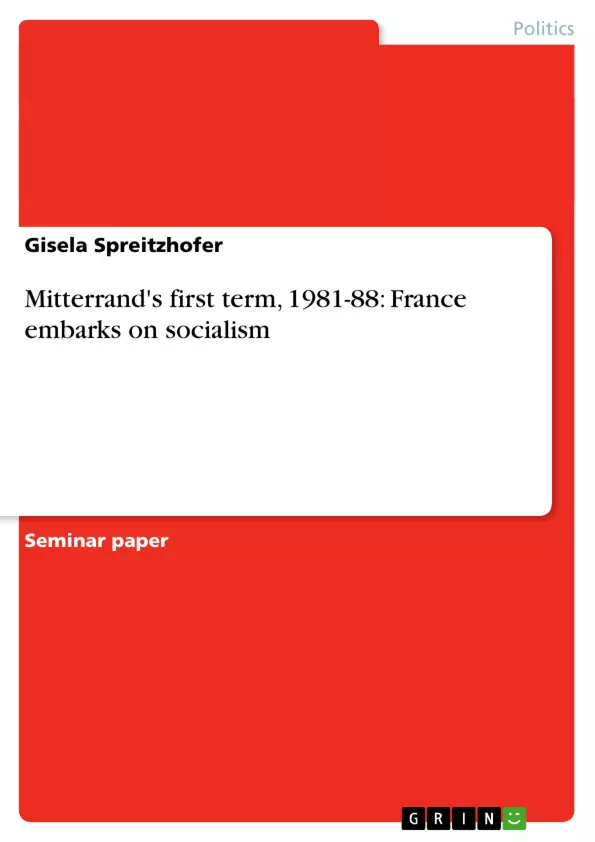François Mitterrand’s election as president of the French Republic on May 10, 1981 marked the beginning of a new era in French politics. For the first time in the Fifth Republic, a socialist had become head of state. The new prime minister Pierre Mauroy formed a ministry that consisted mainly of socialists. Their power was enormous after winning clearly the majority in the National Assembly one month after the presidential elections, reducing both the communists and the conservatives by half. Mitterrand formed a coalition of socialist and communist parties whose goal was to redistribute power between state and society and within society itself.
This paper’s purpose is to assess the achievements and the drawbacks of the socialist experiment launched by Mitterrand in 1981. It proceeds in a chronological order; thus the first part is dedicated to Keynesian redistribution and its limits in 1981-82, the second will deal with austerity measures implemented from 1982-84, the third addresses Fabius’ modernization efforts from 1984-86, and the fourth will cover the 1986-88 cohabitation period. The fifth part will be devoted to the relationship between state and society under Mitterrand. Finally, some concluding remarks will finish the paper in the sixth part.
Inhaltsverzeichnis (Table of Contents)
- SOCIALIST HONEYMOON AND ITS RESTRAINTS, 1981-82
- AUSTERITY MEASURES, 1982-84
- MODERNIZATION AND “NEW POLITICS”, 1984-86
- COHABITATION AND THE RECONSTRUCTION OF POWER, 1986-88
- STATE AND SOCIETY
- CONCLUDING REMARKS
Zielsetzung und Themenschwerpunkte (Objectives and Key Themes)
This paper aims to assess the achievements and drawbacks of the socialist experiment initiated by François Mitterrand in 1981. The paper examines the impact of Mitterrand's first term on French politics, focusing on key policies and their effects on the economy, state-society relations, and political power dynamics.
- The implementation of Keynesian redistribution policies and their limitations.
- The introduction of austerity measures and their impact on the French economy.
- The evolution of state-society relations under Mitterrand's presidency.
- The political landscape of cohabitation and its influence on power dynamics.
- The effects of Mitterrand's policies on French society and the economy.
Zusammenfassung der Kapitel (Chapter Summaries)
Chapter 1 delves into the early stages of Mitterrand's presidency, analyzing the implementation of Keynesian redistribution policies in 1981-82. The chapter explores the motivations behind these policies, their effectiveness in addressing economic challenges, and the limitations they faced. It also discusses the nationalization of major industrial groups and its implications for the French economy.
Chapter 2 examines the austerity measures implemented by Mitterrand's government from 1982-84. The chapter analyzes the economic context that led to these measures, their effects on different sectors of society, and the political consequences of these policies. It highlights the challenges of balancing economic stability with social justice.
Chapter 3 focuses on the period from 1984-86, characterized by modernization efforts and a shift towards a "new politics." The chapter explores the emergence of new political currents, the evolution of Mitterrand's political strategies, and the challenges of implementing reform amidst political and economic instability. It examines the impact of these changes on state-society relations.
Chapter 4 examines the period of cohabitation from 1986-88, where a conservative government coexisted with a socialist president. The chapter analyzes the dynamics of this unique political arrangement, the compromises and conflicts that arose, and the impact on policy-making. It explores how this period affected the balance of power between the executive and legislative branches.
Schlüsselwörter (Keywords)
Key terms and themes in this paper include: French socialism, Mitterrand's presidency, Keynesian economics, redistribution, nationalization, austerity, cohabitation, state-society relations, modernization, "new politics," political power dynamics, economic challenges, and social justice.
Frequently Asked Questions
What was the significance of Mitterrand's election in 1981?
It marked the first time a socialist became president in the Fifth Republic, leading to a major political shift in France.
What characterized the "Socialist Honeymoon" (1981-82)?
This period was defined by Keynesian redistribution policies, social reforms, and the nationalization of major industrial groups.
Why did Mitterrand implement austerity measures in 1982?
The initial expansionary policies led to economic instability and inflation, forcing the government to shift toward "rigueur" (austerity) to stabilize the franc.
What is "cohabitation" in the context of French politics?
It refers to the period (1986-88) when Mitterrand, a socialist president, had to work with a conservative government led by Jacques Chirac.
How did state-society relations change under Mitterrand?
The government aimed to redistribute power between the state and society, though the results were a mix of successful modernization and economic challenges.
- Quote paper
- MMag. M.A. Gisela Spreitzhofer (Author), 2006, Mitterrand's first term, 1981-88: France embarks on socialism, Munich, GRIN Verlag, https://www.grin.com/document/68070



